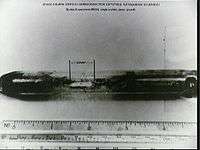Germanium selenide
 | |
 | |
| Names | |
|---|---|
| IUPAC name
Germanium selenide | |
| Other names
germanium(II) selenide | |
| Identifiers | |
| 12065-10-0 | |
| ECHA InfoCard | 100.031.862 |
| PubChem | 12049114 |
| Properties | |
| GeSe | |
| Molar mass | 151.57 g/mol |
| Appearance | black |
| Density | 5.56 g/cm3 |
| Melting point | 667 °C (1,233 °F; 940 K) (decomposes) |
| Band gap | 1.07 eV (indirect) [1] |
| Refractive index (nD) |
2.5 |
| Structure | |
| Orthorhombic | |
| Pnma | |
| Related compounds[3] | |
| Other anions |
Germanium sulfide, Germanium telluride |
| Related |
Lead selenide |
| Except where otherwise noted, data are given for materials in their standard state (at 25 °C [77 °F], 100 kPa). | |
| | |
| Infobox references | |
Germanium selenide is a chemical compound with the formula GeSe. It exists as black crystalline powder having orthorhombic (distorted NaCl-type) crystal symmetry; at temperatures ~650 °C, it transforms into the cubic NaCl structure.[4]
To grow GeSe crystals, GeSe powder is vaporized at the hot end of a sealed ampule and allowed to condense at the cold end. Usual crystals are small and show signs of irregular growth, caused mainly by convective motion in the gaseous medium. However, GeSe grown under condition of zero-gravity and reduced convection aboard the Skylab are ~10 times larger than Earth-grown crystals, and are free from visual defects.[5][6]
References
- ↑ L Makinistian; et al. (2007). "Ab initio calculations of the electronic and optical properties of germanium selenide". J. Phys.: C. 19: 186211. doi:10.1088/0953-8984/19/18/186211.
- ↑ Eymard, R.; Otto, A. (1977). "Optical and electron-energy-loss spectroscopy of GeS, GeSe, SnS, and SnSe single crystals". Physical Review B. 16 (4): 1616–1623. doi:10.1103/PhysRevB.16.1616. ISSN 0556-2805.
- ↑ GeSe at webelements
- ↑ Wiedemeier H., Siemers P.A. (1975). "The Thermal Expansion and High Temperature Transformation of GeSe". Zeitschrift für anorganische und allgemeine Chemie. 411: 90–96. doi:10.1002/zaac.19754110110.
- ↑ "SP-400 Skylab, Our First Space Station". NASA. Retrieved 2009-06-06.
- ↑ H. Wiedemeier; et al. (1975). "Crystal growth and transport rates of GeSe and GeTe in micro-gravity environment". Journal of Crystal Growth. 31: 36. doi:10.1016/0022-0248(75)90107-4.
This article is issued from Wikipedia - version of the 11/30/2016. The text is available under the Creative Commons Attribution/Share Alike but additional terms may apply for the media files.